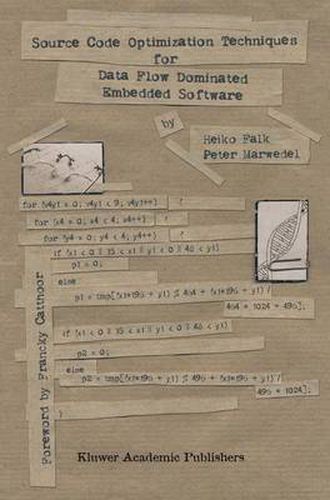Readings Newsletter
Become a Readings Member to make your shopping experience even easier.
Sign in or sign up for free!
You’re not far away from qualifying for FREE standard shipping within Australia
You’ve qualified for FREE standard shipping within Australia
The cart is loading…






This book focuses on source-to-source code transformations that remove addressing-related overhead present in most multimedia or signal processing application programs. This approach is complementary to existing compiler technology. What is particularly attractive about the transformation flow pre sented here is that its behavior is nearly independent of the target processor platform and the underlying compiler. Hence, the different source code trans formations developed here lead to impressive performance improvements on most existing processor architecture styles, ranging from RISCs like ARM7 or MIPS over Superscalars like Intel-Pentium, PowerPC, DEC-Alpha, Sun and HP, to VLIW DSPs like TI C6x and Philips TriMedia. The source code did not have to be modified between processors to obtain these results. Apart from the performance improvements, the estimated energy is also significantly reduced for a given application run. These results were not obtained for academic codes but for realistic and rep resentative applications, all selected from the multimedia domain. That shows the industrial relevance and importance of this research. At the same time, the scientific novelty and quality of the contributions have lead to several excellent papers that have been published in internationally renowned conferences like e. g. DATE. This book is hence of interest for academic researchers, both because of the overall description of the methodology and related work context and for the detailed descriptions of the compilation techniques and algorithms.
$9.00 standard shipping within Australia
FREE standard shipping within Australia for orders over $100.00
Express & International shipping calculated at checkout
This book focuses on source-to-source code transformations that remove addressing-related overhead present in most multimedia or signal processing application programs. This approach is complementary to existing compiler technology. What is particularly attractive about the transformation flow pre sented here is that its behavior is nearly independent of the target processor platform and the underlying compiler. Hence, the different source code trans formations developed here lead to impressive performance improvements on most existing processor architecture styles, ranging from RISCs like ARM7 or MIPS over Superscalars like Intel-Pentium, PowerPC, DEC-Alpha, Sun and HP, to VLIW DSPs like TI C6x and Philips TriMedia. The source code did not have to be modified between processors to obtain these results. Apart from the performance improvements, the estimated energy is also significantly reduced for a given application run. These results were not obtained for academic codes but for realistic and rep resentative applications, all selected from the multimedia domain. That shows the industrial relevance and importance of this research. At the same time, the scientific novelty and quality of the contributions have lead to several excellent papers that have been published in internationally renowned conferences like e. g. DATE. This book is hence of interest for academic researchers, both because of the overall description of the methodology and related work context and for the detailed descriptions of the compilation techniques and algorithms.